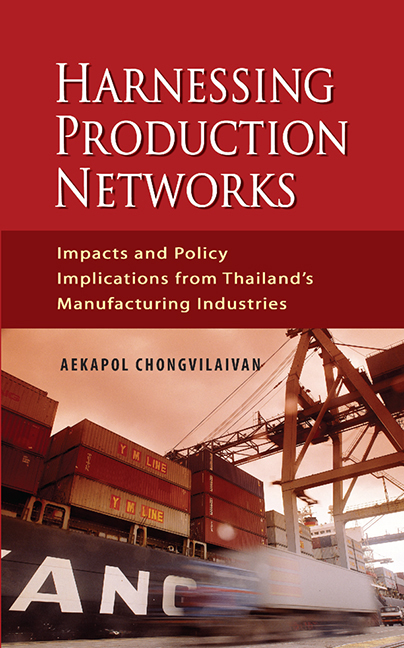 Harnessing Production Networks
Harnessing Production Networks Published online by Cambridge University Press: 21 October 2015
Introduction
A growing number of recent studies dealing with the economic impacts of production fragmentation on the labour market have increasingly weighed in on the phenomenon of a widening income gap between skilled and unskilled workers in developed countries. In these studies, the evidence pointed to the international dimension of production fragmentation — particularly, international outsourcing or the uses of intermediate imports — as a key catalyst of this trend in that technical advances in information technology and closer trade ties to the global market have entailed surges in outsourcing of less skillintensive activities to unskilled labour-abundant countries, thereby spurring the worsening wage inequality in terms of exporting unskilled jobs to developing countries (Amiti and Wei 2009). A theoretical relationship between imports of intermediate inputs and a shift in relative demand for skilled workers observed in the industrialized economies lies with the standard Heckscher-Ohlin (H-O) Theorem. In this well-known theoretical framework, the industrialized economies where skilled labour is typically well-endowed are predicted to specialize more skill-intensive production activities and make use of less skill-intensive intermediate imports from developing countries where unskilled labour is relatively abundant. Given the perfectly competitive labour market, the reallocation of resources toward skillintensive sectors will ultimately shift the relative demand for skilled workers in industrialized economies.
Recent developments, nonetheless, indicated that developing countries are also affected by fragmentation of the production. In fact, outsourcing activities have increased substantially among the Southeast Asian countries (Ahn et al. 2008). Even though Japan has long been an important source of intermediate inputs for these regions, the evidence shows that the Southeast Asian countries are also emerging as crucial source countries for intermediate inputs. Concurrently, it has been observed that the Southeast Asian countries have experienced staggering increases in intermediate imports from China and other key Southeast Asian members, especially Indonesia, Malaysia, the Philippines and Thailand. These observations therefore highlight that firms operating in this region procure intermediate inputs from both local and foreign suppliers.
In this regard, the idiosyncratic nature of outsourcing activities in this region forces me to approach this empirical question in a non-standard way. The impacts of production fragmentation on labour markets in developing Southeast Asia must pertain not only to the imports of intermediate inputs, but also to contracting out production activities at arm's length locally.
To save this book to your Kindle, first ensure [email protected] is added to your Approved Personal Document E-mail List under your Personal Document Settings on the Manage Your Content and Devices page of your Amazon account. Then enter the ‘name’ part of your Kindle email address below. Find out more about saving to your Kindle.
Note you can select to save to either the @free.kindle.com or @kindle.com variations. ‘@free.kindle.com’ emails are free but can only be saved to your device when it is connected to wi-fi. ‘@kindle.com’ emails can be delivered even when you are not connected to wi-fi, but note that service fees apply.
Find out more about the Kindle Personal Document Service.
To save content items to your account, please confirm that you agree to abide by our usage policies. If this is the first time you use this feature, you will be asked to authorise Cambridge Core to connect with your account. Find out more about saving content to Dropbox.
To save content items to your account, please confirm that you agree to abide by our usage policies. If this is the first time you use this feature, you will be asked to authorise Cambridge Core to connect with your account. Find out more about saving content to Google Drive.